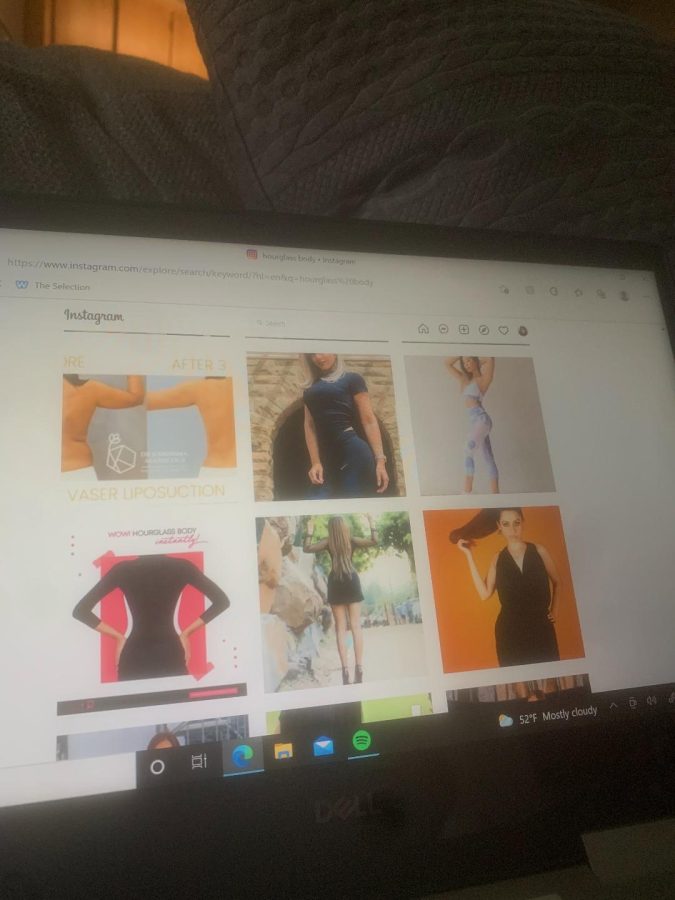Social Media Gives Young Women a Negative Perception of Their Bodies
January 5, 2022
Social media has been developing since the very late 90’s. It’s known to help you stay connected with your friends and family through your phone. But, various platforms are pushing body standards on young women and it’s mentally straining. For example, Instagram is very well known for its models and influencers such as Demi Rose, Sommer Ray, and Corinna Kopf. Not all influencers do this but a lot of them photoshop their pictures or promote some sort of supplement claiming that that is what gave them their “perfect body.”
Another platform, Snapchat, creates thousands of beauty filters that will clear your acne, make your face more slim, and plaster digital makeup on your face. There are also a countless number of apps such as Facetune and Retouch Me that you can use to photoshop yourself into being skinnier or to make yourself prettier.
According to an article on the BBC News, cosmetic surgery rates have spiked up by 20% since 2008. Considering that cosmetic surgeries are expensive, it truly shows how much effect social media has on young women.
The very first few posts that I see on my Instagram explore page or on my Pinterest feed usually are “hourglass body workouts” or “how to get a flat stomach in one week!” I don’t even look up anything about diets or working out so it might not have much to do with the algorithm.
Emely De Leon, a freshman at San Rafael High, notices this too. She usually tries to ignore those kinds of posts because it’s not something she is necessarily interested in. “Most of the social media platforms I use recommend workout routines and fitness videos along with other content,”
Although a healthy lifestyle is encouraged, healthy doesn’t always look like a flat stomach and a small waist just like how unhealthy doesn’t always look like someone who is overweight. It’s okay to want to eat healthy meals and to want to do exercise, in fact, the body needs it, but social media should not be pushing unrealistic beauty standards on women.
At a young age, girls are placed under all kinds of standards which develop into insecurities. They wear baggy sweaters to hide their stomach or beg their mom for a razor and tweezers because they’re being made fun of for their eyebrows and body hair.
People assume that women can accept the standards without feeling diffident about themselves. But the more society and social media pushes beauty standards on us, the more we will lose control over our insecurities and give in to eating disorders and other unhealthy habits.
Many young women have struggled with body image in some sort of way. “I started to do a lot of at home workouts and when I didn’t see anything changing I would try things like eating less and drinking lots of water to see if I make progress,” said Erica Mendez, a senior at Terra Linda High.
When influencers alter their bodies, this takes a big effect on young women who already have an issue with how they look. “Looking in the mirror made me feel sad because I didn’t look like the influencers and it caused me to dislike myself for a while,” she said.
Erica is not the only one who faces this problem. An article by Break Binge Eating states that around 50% of 13 year old American girls struggle with body image. The percentage went up to almost 80% once the same girls grew older to 17 years old.
“I had a slight eating disorder from being so insecure about my body since my Instagram and Pinterest just showed me skinny girls with thigh gaps and their ribs popping out,” said Lizbeth Mendieta, a junior at Novato High.
She spent lots of time on social media finding ways to lose weight and struggled with her relationship with food. “At one point, I got an oatmeal and green tea addiction. I love them now, but I only started consuming them because I was told they’d help lose weight and I always like to do stomach massages for a faster metabolism,”
Nowadays, the American beauty standard is too strange. Your body is expected to look a certain way but you can’t have the “negative effects” of your body looking that way. For instance, you’re expected to have big thighs but you need to have a thigh gap and you can’t have stretch marks or cellulite. Or, you need to be “natural” but you can’t have acne and need to be hairless. But one day the standards will change. The cycle shifts every few years to new beauty expectations and the old ones will no longer be considered “valid” or “trendy”
In no way can the hourglass body type be obtained to the exact measure. No matter how flat your stomach is, your lower abdomen will still stick out a bit because important organs like the uterus and/or your small and large intestines are inside. If you have big thighs and a big butt, you won’t have a thigh gap and you probably won’t have a flat stomach. It is completely normal to not fit into every category of this beauty standard because it is too unrealistic.
To be completely honest, even I have fallen into the trap of these beauty standards. At times, I begin to feel insecure about myself. I look at myself in the mirror and just feel unhappy or sometimes start to feel bad whenever I eat anything. I don’t like walking down school hallways because I start to compare myself to other girls. But, there are other times where I feel completely confident in my body and don’t have a problem with it.
I constantly have mixed emotions over my body. Sometimes I catch myself thinking about how much better I would look if I was skinny but other days I feel more thankful for everything my body has done for me. I don’t want to waste my entire life hating myself. I just want to feel comfortable in my own skin.
Don’t let social media trick you into thinking that the only way you will ever be considered “valid” is if you have the hourglass body type. Our body is meant to keep us alive and not to please everyone else. It’s okay to not feel completely confident with yourself every once in a while but just remember that not everyone on the internet shows their true self.







































Bill Allan • Jan 7, 2022 at 8:48 am
Nice work Evelyn. Honest and personal, as always.